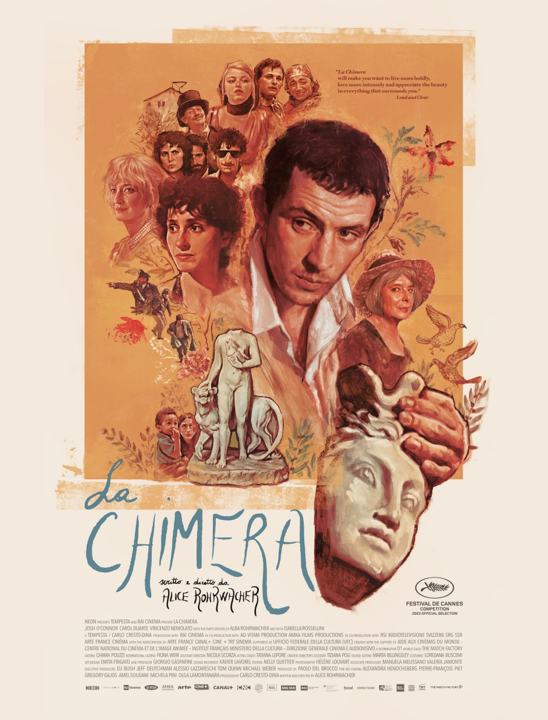




| Director | Alice Rohrwacher |
|---|---|
| Country | Italy |
| Year | 2023 |
La Chimera, written and directed by Alice Rohrwacher, premiered at the 76th Cannes Film Festival in May 2023, receiving a nine-minute standing ovation and competing for the Palme d’Or. It later screened at the New York Film Festival and Busan’s 'Icon' section, before releasing across Europe and North America in late 2023 and early 2024. The film blends magical realism with caper-like whimsy, rooted in Rohrwacher’s deep affection for her native Umbria and its buried histories.
Set in Tuscany during the 1980s, La Chimera follows Arthur (Josh O’Connor), an English archaeologist freshly released from prison. He joins a ragtag band of tombaroli—Etruscan grave-robbers—using his dowsing gift to locate buried antiquities. Yet Arthur’s quest transcends profit; he is haunted by Beniamina, his deceased lover, and driven by the hope of reaching her through the past. As he navigates tombs, thefts, and drunken parades, a delicate romance ignites with Italia (Carol Duarte), a former student of Beniamina. The film balances levity and longing, inviting us to question whether history and grief can be excavated or if they remain ghosts.
Josh O’Connor’s portrayal of Arthur is quietly magnetic—rumpled, mournful, and searching. His embodiment of a man caught between worlds feels richly internal, making his journey through grief a form of archaeological excavation of his own soul.
Isabella Rossellini, as the aristocratic Flora, brings restrained elegance and emotional weight, playing the mother of Beniamina with nostalgic gravitas. Carol Duarte’s Italia embodies youthful idealism and grief, a musical, restless force who contrasts with Arthur’s inertia.
The tombaroli, including Pirro (Vincenzo Nemolato), lend the film a Fellini-esque spontaneity; their camaraderie feels both theatrical and rooted in community, affirming a world torn between survival and ceremony.
La Chimera is an elegy to longing, memory, and the seduction of loss. Rohrwacher interlaces the absurd with the poignant—sleeping train sequences, direct-to-camera asides, and slapstick touches hint at dream logic while grounding us deeply in emotional terrain. This is a film where the past is not merely recalled but summoned, as Arthur resists moving forward and instead digs deeper, both literally and emotionally.
Rohrwacher’s films often blur the line between documentary intimacy and mythic atmosphere. La Chimera continues this, casting tomb-robbing as a ceremony, and grief as excavation. The tone is at once mischievous and sacred, as Italy’s landscapes, accents, and rituals pulse through every frame.
Cinematographer Hélène Louvart bathes the film in a gauzy haze, imbuing Tuscany with ethereal glow. Visual textures—cracked walls, misty fields, and corroded relics—create a timeless, haunted atmosphere. Rohrwacher favours episodic rhythm over conventional arc; scenes drift into folklore and memory, entwining playful nightmare with burial ritual.
The film’s structure is deliberately disorienting—sped-up slapstick thefts and shifts in aspect ratio punctuate the narrative, reminding us that we are inside a fairy tale, not a documentary.
At its core, La Chimera is a meditation on cultural patrimony and personal loss, suggesting that excavating history is also excavating oneself. In an era where repatriating artefacts and reckoning with heritage matter, Rohrwacher’s film imagines what happens when a man seeks to resurrect both archaeology and romance. It invites UK audiences to consider what we salvage from history—and from grief—and at what cost.
La Chimera is a beautifully elusive fable, where archaeology, grief, and folklore converge in poetic harmony. Josh O’Connor's disconsolate Arthur is both a haunted ghost and a spirited seeker. Rohrwacher invites us to dig into history, memory, and the impossibility of letting go. It’s a film that resists easy definition—and lingers in the soul.
In an effort to reduce our paper usage, we stopped offering printed copies of our popular Film Notes at our screenings.
Instead, we are encouraging our members to read the Film Notes online. For those who wish to do so, it is still possible to print these pages prior to the film.
Alternatively, if you want to read the notes just before or just after the film, and also minimise your paper consumption, then you can scan the QR code to your phone and then download the webpage.
